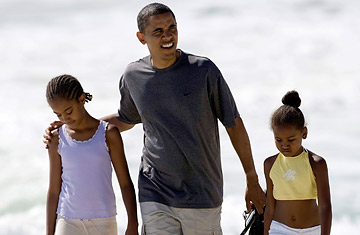
Barack Obama walks down the beach with his daughters Malia, left, and Sasha during his vacation to Hawaii.
It was three days before the new year in late 2006, and I was eating a burger with the traveler and writer Paul Theroux on Oahu's North Shore. Beside us in the rickety little shack was a quintessentially Hawaiian group of Chinese Americans, African Americans, semi--Southeast Asians and kids who could have been any or all of the above, waiting for the dad in the group to bring over their avocado burgers from the counter. It took Paul and me a few seconds to realize that the dad in question--who looked like a skinny teenager--was, in fact, the freshman Senator from Illinois, who was expected to enter the presidential race in the next week or two.
We couldn't help breaking in on his private moment to say hello, and Barack Obama, intruded upon in a place he'd probably come to get away from people like us, could not have been more friendly and engaged; we felt we could have talked burgers--and places and books--with him all day. But you expect that of a politician, whose livelihood depends on winning hearts. The more remarkable thing, we both felt, was that this sparkling stranger was so much like the kind of people we meet in Paris, in Hong Kong, in the Middle East: difficult to place and connected to everywhere. Like the air of his home island (not really Eastern or Western, but a vibrant mingling of the two), he spoke for the dawning global melting pot of today.
It has become part of the familiar story now, repeated so often we can barely hear it, but anyone who steps out of the U.S. today, in any direction, quickly sees that the American Century has become the Global Century and that where a generation ago much of the globe was trying to look like America, now it's America that needs to get in tune with the rest of the globe. The very presence of someone like Obama shows this is possible. But the story of the 21st century so far has been of a fast-moving train that the U.S. (like its enemies) declines to board.
Everywhere I've been this year--from Jerusalem to Japan to Colombia to Italy and back again--I've heard people essentially say that America is an overweight, white plutocrat who is not only out of touch with the world but also shows no signs of wanting to grow closer to it. This is as unfair as any image--contradicted at every moment by the kindness and curiosity of many Americans--but it remains a potent one in a world where people communicate more with images than ideas and assumptions travel faster than truths. The best way to begin to correct it is to show the world a leader who can't really say how much he's African or Asian or American or just a product of their mixing in Hawaii. The point is not just that Obama will bring globalism to America; in his name, his face and his issues, he'll bring America back to the globe.
You could, in fact, say it is the questions that he draws from his experience that are as important as any answers he may come up with. How to make a peace between the black and the white inside him (or inside our cities and our country)? How to do right by our relatives in Africa without dishonoring the grandparents from Kansas who raised us? How to bring the modest Muslim school in Java together with Harvard Law School? The questions Obama has been thinking about all his life are the very ones that dominate the world today. And the mounting economic crisis only makes the construction of a wider identity--and conversing across the waters--more urgent, not less so.
